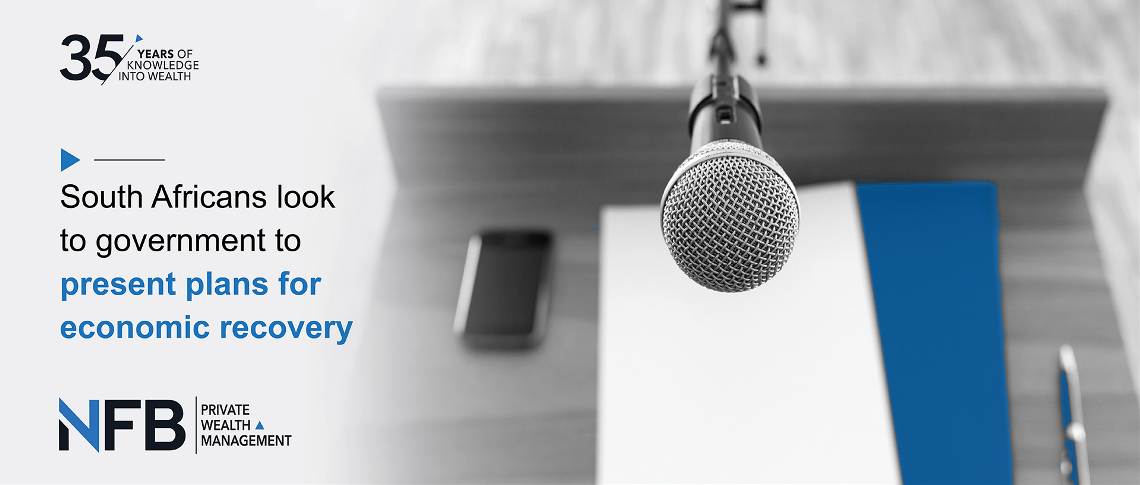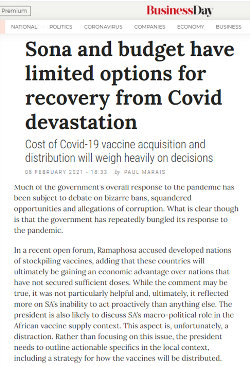What to expect from 2021’s SONA and Budget Speech
South Africans look to government to present plans for economic recovery


February is traditionally the month the president delivers the annual State of the Nation Address (SONA) where he outlines government’s plans for the year ahead, followed shortly thereafter by the finance minister’s budget speech where the latter outlines how government’s budget will be allocated. This year both the SONA and the budget must address plans for the country’s recovery after the Covid-19 pandemic and prolonged lockdown decimated an already struggling economy.
The most urgent priority for government is to acquire sufficient doses of the Covid-19 vaccine and then to distribute these vaccines as quickly as possible. Government has come in for criticism for not being more proactive in its strategy to acquire the necessary numbers of vaccines. It was therefore encouraging news that an additional 20 million doses of the Covid-19 vaccine have been secured from pharmaceutical company Pfizer to add to the 1.5 million doses that have been acquired from AstraZeneca through the Serum Institute of India, nine million doses from Johnson & Johnson and 12 million from Covax.
President Ramaphosa is expected to reveal specifics regarding South Africa’s Covid-19 vaccine acquisition and how the vaccine will be distributed in his SONA this month. Much of government’s overall response to the pandemic has been subject to debate given bizarre bans, squandered opportunities and allegations of corruption. What is clear is that government has bungled its response to the pandemic time and time again.
In an open forum President Ramaphosa recently accused developed nations of stockpiling the vaccine, adding that these countries will ultimately be gaining an economic advantage over nations that have not secured sufficient doses of the vaccine. While the comment may be true it was not particularly helpful and ultimately reflected more on South Africa’s inability to act proactively than anything else.
The president is also likely to discuss South Africa’s macro-political role in the African vaccine supply context. This aspect is, unfortunately, a distraction. Rather than focusing on this issue, the president needs to outline actionable specifics in the local context, including a strategy for how the vaccines will be distributed.
Government is determined that it alone will control the acquisition and dictate the distribution of vaccines. However, as a United Nations report pointed out recently, both the acquisition and distribution of Covid-19 vaccines provides an unprecedented opportunity for corruption, nepotism and favouritism.
The cost of vaccine acquisition will be addressed by the finance minister in his budget speech later this month. He is unlikely to allude to the fact that the revenue in lost sin taxes as a result of the five-month ban on the sale of tobacco products and successive bans on the sale of alcohol would have been more than sufficient to pay for the vaccines. It’s important to remember that in addition to acquisition costs, government must factor in the cost of distribution, including the cost of nurses, PPE and needles to administer the more than 40 million vaccines.
The finance minister is likely to explain how government will pay for the vaccine and whether there will be a one-off ‘vaccine tax’ – which is not something that we believe is likely to occur – whether spending will be reprioritised from elsewhere, or whether additional debt will need to be raised. If it’s the latter, where will this debt be raised and how much will it cost the country in the long term? Another IMF loan is a possibility.
The finance minister’s biggest challenge is a decline in tax revenue over the last 10 months. To address this National Treasury will be forced to look at increasing taxes. There have been murmurings of a proposed wealth tax in recent weeks to address the shortfall in the fiscus. However, Laffer curve dynamics (the ability of a higher tax rate to actually result in higher taxes) indicates that the wealthy are likely to have already structured their affairs so that any proposed new taxes won’t apply, or they will be doing so very soon. As a result, we don’t believe a wealth tax is likely to be implemented.
Although there may be discussion around prescribed assets, government will need to carefully define the parameters given that assets that could be prescribed are already invested in things like government bonds. To ensure a carefully considered definition and a sensible outcome will require industry consultation which will take some time.
The National Development Plan mentioned at last year’s SONA will likely die a quiet death, to be replaced by the Economic Recovery and Reconstruction Plan government launched in response to the Covid crisis. The former’s demise is unfortunate as some reconciliation between these two ambitious projects would have been preferable.
President Ramaphosa’s direct foreign investment drive has been negatively impacted by the events of the past year and is most evident in the cancellation of a number of major investment projects, particularly in the alcohol production business. In his SONA the president is expected to address this decline through further investment programmes such as the recently launched R1.2 billion Tourism Equity Fund initiative.
A lack of energy security is one of the biggest impediments to an economic recovery. Last year a significant emphasis was put on the restructuring of Eskom and the role of independent energy producers. However, the fact that we are still experiencing load shedding indicates the lack of progress that has been made in this area. Expect more talk on energy security from the president but unfortunately, there are not likely to be any impactful or meaningful announcements made.
National Treasury recently released guidance around the hurdles required to secure guarantees from government for state owned enterprise (SOE) debt after it declined to guarantee new Land Bank debt. The finance minister is likely to discuss National Treasury’s philosophical approach to injecting equity capital into SOE versus providing guarantees. The former is riskier but is far less likely to be used. The question now is whether National Treasury’s finances have actually improved on the back of this change in philosophical approach?
The fact that the hurdle for government assistance to SOEs is now so much higher should be regarded positively. At the very least, it ensures that these entities start to think along more commercial lines.
The finance minister has no choice but to curb bail outs to inefficient SOEs. The International Monetary Fund (IMF) recently reiterated the need for South Africa to curb its excessive public sector wage bill and said ill-targeted transfers to inefficient SOEs continues to be a cause for concern.
While education and unemployment are likely to be discussed at length once again in this year’s SONA, the emphasis now is likely to be on the cohort of disadvantaged learners and students who reside in remote areas and lack reasonable internet access. Estimations are that the Covid pandemic is likely to cost these individuals two or even three years of education. This signifies a desperate situation for an extremely vulnerable sector of our population. Government has a responsibility to ensure that this cohort does not become a lost generation. However, with a constrained budget, the solutions to this challenge are limited.
 A version of this article was published by Business Day on Monday 8 February. You can access their coverage of Paul Marais commentary here.
A version of this article was published by Business Day on Monday 8 February. You can access their coverage of Paul Marais commentary here. 












